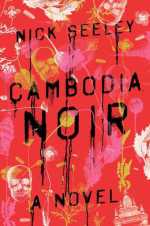Cambodia Noir by Nick Seeley
Published on March 15, 2016
Scribner
Source: I bought it

“A high-octane thriller with a heart-stopping conclusion about a mysterious American woman who disappears into the Cambodian underworld, and the photojournalist who tracks her through the clues left in her diary.
Phnom Penh, Cambodia: The end of the line. Lawless, drug-soaked, forgotten—it’s where bad journalists go to die. Propulsive, electric, and filled with unforgettable characters, Cambodia Noir marks the arrival of a fresh new talent. Nick Seeley is an ambitious, wildly imaginative author and his enthralling debut explores what happens when we venture into dark places…when we get in over our heads…and when we get lost.” Source: Simon & Schuster.

Review
“She didn’t care about the money… She didn’t care about the story. Or me, or Sam, or even drugs. She didn’t have reasons. She just wanted to see what was in the dark…”
Cambodia Noir reads like a drug-induced frenzy, like falling into an abyss of human depravity, senselessness, unmoored emptiness and despair. Steely’s voice as our protagonist, washed-out journalist Will, is mesmerizing, and offers – for the reader at least – a sobering portrait of how far any of us may fall through a combination of denial, repression, and addiction. Addiction not only to drugs, but to the next blood-curling experience, the next big score (in this case, the Pulitzer-worthy story).
Will, in denial and repressing tragic memories of reporting in Afghanistan, comes to Cambodia to get lost (mostly from himself, he is not being literally hunted). He chases down stories about the corruption, political machinations, drug running and the like – all while fully saturated in a highly volatile concoction of drugs, caffeine, nicotine, alcohol, and whatever other substance he can get his hands on that will help his memories fade.
And yet, as dark and violence-prone as his life already is, Will finds out it can get much worse on the day he is contacted by a wealthy Japanese American. This woman wants him to find her missing sister, who had interned at Will’s paper. The story unfolds into a complex and nuanced plot involving American law enforcement, Japanese mafia, drug trade & policy, sex-trafficking, corrupt Cambodian police, Cambodia politics, international NGOs working in Cambodia, etc.
I loved Seeley’s style – he weaves an incredibly intricate tapestry, and his language perfectly renders the drugged-out-thrill-seeker who is running away from himself/the world. Yes, Will is a bit detestable, or perhaps just pathetic, or just a human who has allowed himself to fall – depending on your outlook – but to most he’s probably not a sympathetic character. Still, Seeley draws us into Will’s world in such a way that we can at least begin to understand it (as a horrific cautionary tale in the very least), even if we may not sympathize. So, excellent characterizations.
There were a few detractors for me. One was the depiction of Cambodia as a dark, desperate, fringe place that no one would consider being unless they were in hiding (most of our characters are running away from something, and most are not Cambodian). I’m from Romania, and what annoyed me about Cambodia Noir is the same reason “Dracula” reallygets on my nerves – some Irish guy decided to find the most “back-water” uncivilized place that “no one had ever heard of” and fabricate a story out of whole cloth devoid of any local history or lore. So I’m pretty sensitive when some Western man goes into what they deem a “backwards”, or in this case, ultimately-bleak and depressing country, and weaves stories about its people from solely from their own point of view.
Cambodia Noir is crippled not by Seeley’s perspective – he gives every indication towards the end that he realizes his depiction of Cambodia is only the dream of some strung-up junkie. What goes wrong is that because he is writing from an addict’s perspective, the narration is incredibly myopic – there’s the next fix, be it drugs or action, but not much else other than darkness and dysfunction.
To Seeley’s credit, he does give one tinsy voice to a very minor character, who towards the end rebukes Will’s offers to “save her” from her home: “I am not a dream. I am real. I was born in a Khmer Rouge Camp. I grew up in the war. Now we have peace, and someone dies every day. But it is always my home”… Then later, Will understands that “Cambo only existed through the lens of those places we created: a world built to reflect us back at ourselves, a world of poverty and deference…” I wish there had been a bit more of this – if there were, I wouldn’t be subtracting this from my rating…
Which brings me to my second detractor. The ending was incredibly rushed, and to me “the solution” also felt a bit contrived. The entire novel, we are led through Will’s life moment by moment, but yet the last couple chapters fly by in a rush, we are given only broad outlines about how Will finds the sister, and what she’s up to didn’t seem to follow from anything else that had happened.
Overall, a unique, masterfully written, soul-wrenching debut that probes the depths of the darkness of human nature.But, it’s probably not for everyone. There is a lot of violence, drugs obviously, other things we never speak about in “polite” company, and also frequent allusions to the child-sex trade.

